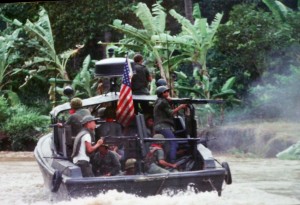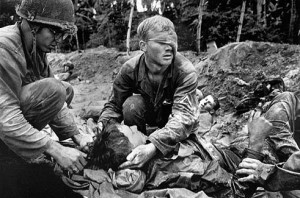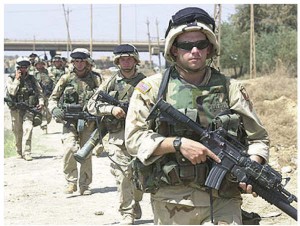Jan
30

Guest Post by John DiCiacco:
(A brother, a friend, and a combat veteran)
This was taken from a book I recently read titled “DUTY, HONOR, SACRIFICE” written by Ralph Christopher. It is about the Brown Water Sailors and the Army River Raiders I served with in Vietnam.
The following was written in 1985 by Terry Sater who served aboard one of the PBR’s in the Mekong Delta. He was upset after hearing that one of his shipmates from Tango 6 had not fared well after the war.
His wife suggested that he should forget the war and get on with his life. So he stayed up late that night trying to figure out how to explain it all to her. The next morning Terry gave his wife this poem.
It reads:
She said, “Why not forget it? It happened so long ago.”
The deepest wounds, cut to the heart, will always heal slow.
The nightmare of the Mekong, of death, despair and fear,
Could not be left in Vietnam, its fresh, its crisp, its here.
My body’s strong. My mind is sound. I suffer from no pain.
But once a man has been to war, he’s never quite the same.
For I know war for what it is, no glory in the fight.
It’s friends who die, and crippled kids, and voices crying in the night.
I know the chill of monsoon rain, the heat of tropic sun.
For some it never happened, and most will never know,
Except for those who fought the war. It happened long ago.
Jan
28
Tears of the Children
Filed Under Trauma | Comments Off on Tears of the Children

by Janet J. Seahorn
Normally our blog focuses on the effects of combat trauma to military personnel, their families, friends, and communities. Today is moving to the broader devastation of trauma. Trauma not caused by war and hate, but by nature. Trauma, that even with the greatest technological advances of man, cannot be halted or many times even predicted beforehand. Such is the current state of Haiti.
For me the effects of war trauma on children may be even worse, because it is not due to outside forces of nature, but hate, greed, or lack of compassion for others. Hate which is colored by the darkness of men’s hearts and even nation’s souls. Unlike nature, the torture and killings go on for years, with little hope of relief.
In Haiti, however, what we continue to see are a people doing what they can to help their neighbors and communities. Yes, there is looting and even violence. Desperate people act in desperate ways when one’s life, and the lives of one’s families are at stake. Fighting for the every day things most of us take for granted: water, food, a safe place to sleep, medical care… and the list grows.
When looking at the photos of children, I can’t help but wonder what are they able to understand about this terrible event? How can they make sense of horror? In a country where hundreds of thousands of children were abandoned before the earthquake, who will take care of these babies and children now? Who will hold and comfort them? Who will help to explain the experience and give them the physical and emotional support to heal?
What we currently know about childhood trauma is that it can be more difficult to heal. The brain has not connected the higher order neural networks that help adults sort out the facts of any event. Adults have far more coping skills. Children, have far fewer in their young minds. They have not lived long enough or had enough experiences to compare or sort out the hues of trauma. Their world is very concrete – what one sees is what one understands at a very concrete level.
We used to believe if a terrible act happened early in life, the person could more easily mend. Current neuroscience has proven this belief is a highly inaccurate myth. The earlier the trauma on a young brain, the worse the effects can be if the child is not given the physical and emotionally support needed for healing. Healing that will allowed the child to grow in a world where he/she can still feel safe. Healing that offers hope and resilience from future traumas because they were loved, comforted, and supported when they so desperately need these acts of security.
Therefore, keep all of our children in your hearts and prayers, whether they are in Haiti, Afghanistan, or your own neighborhood. Pray for the mending of our children’s bodies, minds, and hearts. They are the world’s future. We must do all that is necessary to try to ensure that their future is built on a foundation of compassion, kindness, and humanity.
Jan
19
The Nightmare Revisited
Filed Under Life, Peace, Today's War, Trauma, War | Comments Off on The Nightmare Revisited

By Janet J. Seahorn
Last year at this time, Tony and I were in Vietnam and Cambodia. It was a humbling, yet inspiring excursion. As Tony stated many times, he did not go there to heal or recreate the war. He wanted to visit, only to see how things had changed, with hopes that the people and the country were mending.
By all outward appearances hope seemed to be occurring. Yet, what keep coming back to me, were the faces of the old women. We did not see the same number of older men, perhaps because many of this age were killed in the war. The women’s faces were not happy. Their features lined with rivers of anger. It was the eyes that held the emotions, and for many, their emotions were tortuous and hate-filled. What haunts me now are the faces I glimpse in the newspapers of civilians in Iraq and Afghanistan; similar looks living in human bodies experiencing similar horrors of war.
As we continue to read of the escalation of suicides of returning military men and women, I wonder if such unforgettable faces are haunting them. Faces of the enemy, faces of their comrades, faces of the children? In the first few blogs of this New Year, I wrote of Peace. Can it be attained in a person’s mind and heart after experiencing so much? I very much want to believe such a peace is possible. For others, the hideous experiences continue to dig deeper ravines into the soul. To heal, even a bit, these gorges must be filled in gradually.
Perhaps not fully, but even building up the crevasses a little keeps one from falling into the yawning depths of depression, anxiety, and hopelessness. As long as one can look up and see the sky, hope is present. It is when one’s existence is swallowed in darkness that even the tiniest light is diminished. Finding ways to keep the sunlight accessible for our returning vets will be the work of everyone: the nation, its people, families, friends, communities, and most importantly, the veteran.
We have troops leaving daily for the war zone, and others returning. A 2008 Rand Corporation study revealed that 300,000 troops who served in Iraq and Afghanistan had Post-Traumatic Stress, while 320,000 reported probable traumatic brain injuries. Both conditions greatly increase the likelihood of attempted suicide. “According to a Congressional Quarterly compilation in late November 2009, 334 active-duty military service men and women have taken their own lives in 2009” (Edward Pages, 2009: The Year of Soldier’s Suicide), and this does not include those military individuals who have been discharged.
Let us all be sure to look into these eyes of freedom and not dismiss the signs of their sacrifice. Peace and healing is everyone’s work; everyone’s answerability. As a nation, it must be our core mission to mend and heal all those that fought in lands where few of us ever think to venture.
I doubt if many of our returning military personnel have rational thoughts of wanting to return to the combat zone. It took almost forty years for us to do so.
One of our favorite veterans, Michael MacDonald, wrote us the other day relating his response to those who frequently ask him if he ever wants to return to Vietnam for a visit. His reply, “Why, I was just there last night.”
And, for many, this statement is all too true. It is those nights without returning that we pray for in our sleep and dreams. It is those nights without revisiting the nightmares that keep us healing.
Jan
12
Another Perspective on War
Filed Under PTSD, Today's War, Trauma | 1 Comment
by Janet J. Seahorn
It is a snowy Sunday afternoon. I have been running errands, not because I have a great deal to do after the holidays; to be honest, I am merely trying to keep from thinking about the escalation of the war in Afghanistan. When I got home, Tony had posted a new message on our blog that began with “I seem to spend a lot of time thinking about war, even when I don’t want to. The reality of war. The horror of war…” With this blog he added an article from our local newspaper, The Denver Post. It was another reality check from troops actually involved in war, versus media or political rhetoric.
Every day we get emails, phone calls, or an acquaintance sharing a tragic story about a loved one, friend, or just someone they distantly know who is struggling with Post-Traumatic Stress. For those who have and are serving in the current conflict, the stories are so similar to Vietnam veterans it is down right eerie.
For some individuals the nightmares begin immediately. Others seem OK for the first six months or even a year, and then it begins, the panic attacks, unresolved anger, anxiety, and night terrors. The narratives, however, seem to remain the same. The vet initially attributes the emotions to some external force. He/she claims the feelings aren’t real. Given time, everything will be just fine.
Denial is an interesting strategy and may work for a short time, but sooner or later friends and family members will begin to feel the impact of the warrior’s pain. Owning the trauma is the first step to managing it.
I can’t begin to count how many people who have never served in the military, have never had to sacrifice their physical and emotional lives, have never lived with a parent or sibling who is carrying the war’s trauma in every cell of his body says something like, “there is a silver lining in these wars”, “if we don’t fight them there, we will have to fight them here on American soil”.
It isn’t that these individuals are unkind or uncaring; they merely have not had the experience of combat that comes with a very high personal price tag. The ultimate “Golden Globe of Thoughtlessness”, however, are those who doubt that PTSD even exists, and that if it does, it can be easily treated or overcome with just a little effort and personal fortitude.
OK, I admit, I sound cynical. Perhaps what might appease me a bit is giving all of those “others” a chance to sacrifice a bit of what our veterans are enduring. Perhaps, if the families of those “others” would have to witness and battle the demons in their homes with their loved ones, maybe, just maybe, my irritation would subside a bit. Or, maybe, just maybe, one tour of duty is enough for any warrior.
What I cannot accept is that this current war is being fought by less than one percent of the American population and that one percent isn’t comprised of the well-off and well-to-do. As a country we are passively engaged in a practice that will come to haunt us.
Haunt us as a country; haunt us in our communities; and haunt us as moral beings. For sooner or later, as a nation we will have to face the consequences of our inequitable actions. The price will be expensive and ugly.
I wonder if our country’s leaders and the American people will be willing and able to cover the costs.
Jan
6
2010 New Year’s Wishes
Filed Under American Patriotism, New Year, Peace, War | Comments Off on 2010 New Year’s Wishes

by Janet J. Seahorn
It’s already time for a brand New Year
Filled with new hope, dreams and some cheer.
For many their prospects are filled with great joy
While others the forecast may seem a bit grim.
Perhaps we can change the Year 20 and 10
And make it a season for our world to mend.
A year of forgiving,
A year of great love,
One of abundance sent from above.
A year without conflict,
A year where wars end,
A time where the goodness of angels commend.
A year of good fortune,
A year without hate,
When lies and untruths and battles abate.
A year where one’s word
Can be totally trusted,
Where nothing is left but goodwill and justice.
A year without fear,
A year where we’ve learned
Those rainbows are just around the next turn.
A year where we find
That we are not lost,
That life must be lived no matter the cost.
A year that we take
One step at a time
Trusting to see and feel the sublime.
A very deep breath
And we’re on our way
To making each moment a true New Year’s Day.
May your coming year be filled with love,
safe-keeping and prosperity.
Jan
3
A Perspective on War
Filed Under American Patriotism, PTSD, Today's War, War | Comments Off on A Perspective on War
 I seem to spend a lot of time thinking about war, even when I don’t want to. The reality of war. The horror of war. What does winning a war really look like? Are war and terrorism even related or is one a symptom of the other?
I seem to spend a lot of time thinking about war, even when I don’t want to. The reality of war. The horror of war. What does winning a war really look like? Are war and terrorism even related or is one a symptom of the other?
Following is an article in today’s Denver Post which provides a perspective…
-Tony Seahorn
Fool’s game: A soldier’s lament
By Megan Nix
Posted: 01/03/2010
My friend from Denver, a thirtysomething with a full red beard, a plaid shirt, and a loud, choppy laugh, looks like any guy you might have a drink with to talk about girls or music or the work week.
The last time I hung out with him, we shared a beer stein on Larimer Street during Oktoberfest and talked about Halloween costumes. During a more recent happy hour, we talked about the summons he received to deploy to Afghanistan.
Because of the Army’s Uniform Code, I can’t name him. Suffice it to say he’s the one person in the 30,000 who got that call to whom I can give a voice.
It was Nov. 11, 2009, Veterans Day, when my friend was called back to war. His friends had taken him out to shoot clay pigeons in honor of his being a veteran in Iraq, and when he went to his parents’ house for Sunday dinner, a big envelope was waiting for him. He went down into the basement where his father, a potter, was shaping clay. “I just walked up to him and gave him a hug,” he says, smiling from above the amber glow of his draft beer. Hugs are not something he regularly does. “Then I stepped back, and I said, ‘Dad, I’m going to Afghanistan.’ ”
Like most soldiers, he’s dealing with some of the same symptoms as one of his heroes, Audie Murphy, a World War II vet who publicized the unseen wounds of war. Fear, insomnia, depression, a loss of faith in our country’s leaders, and a nightmarish reluctance to re-enter the world “outside the wire.” Like any young man who’s already been to war once, my friend is doing everything he can in order to not be deployed twice.
When he served in Baghdad, there were four to five American deaths a day, the city was a “cesspool,” and “generals were being moved around like playing cards. People don’t realize how much worse it is than what you see on TV. In a city that goes to war, services stop – sewage, water – there’s very limited law and order. You can’t even imagine how awful the world is when a war is happening there.”
Despite his hearty laugh and recurring shrugs, he exudes disillusionment. We’re nestled in a leather booth, and at the bar, two toothless men start to shove each other against the stools and shout obscenities.
“I bet you,” my war-bound buddy says, “at least one of them is a vet.” It doesn’t matter if they’re vets or not, at least one person here is, and those unseen wounds of war? I can see them in this bar.
“My job in Iraq as a public affairs specialist was to prove, ‘What’s the good here? What’s the silver lining? How can I slant this to look good?'” my friend explains. “If you’re very honest,” he says, with signature honesty and one hack of a laugh, “you could never do it.”
One of the reasons he has agreed to talk to me is so that he can be honest, albeit anonymously. The namelessness seems to fit: Both Iraq and Afghanistan are wars largely stocked with low- to mid-level soldiers on repeated deployment. Soldiers from Nowhereville, U.S.A., young men and women who will die largely unrecognized for being, as my friend says, “some sort of hero.”
He’s not in the business of sugar-coating. Bombs are the best way to kill because no one has to be there, he tells me. He recounts how the fluids on the floor of a walk-in freezer stacked with car bomb victims flowed, tar-black, to a drain under his feet. “Beyond capacity,” is how he describes the scene of the nameless corpses. “Innocent victims of roadside bombs gone wrong. The unwanted. Victims that will never ever be identified.”
My friend’s insights increase with the drinks. He points out that while what we have is called a “volunteer army,” life circumstances are what dictate if enlisting is in a kid’s future. “See those guys?” he points to the two men who have stopped fighting and are staring blankly at their sentinel of empty shot glasses. “If they did serve, I can almost guarantee they came from little money. No Haliburton sons and daughters are dying in Iraq or going to Afghanistan,” he says, pushing his finger into the beer-stained table. “I can’t even tell you how many Army leaders I’ve seen without a combat patch (signaling they’ve been deployed) on their right arm. It just shows you how many people aren’t bearing the weight of this war.”
The weight of his story accumulates like a collection of heavy fragments.
A break for a granola bar on the back of Vehicle 2. A deafening explosion. A puff of smoke where Vehicle 4 had been.
Like many young men who enlist, my friend wanted to be independent of his parents and the military was the best possible solution, so he enlisted five years ago. “I thought if I don’t find anything I’m passionate about, I should go,” he says.
By now, he’s gathered plenty of things to be passionate about. One of them is not returning to Afghanistan. As a technically disabled vet who already did five years, was honorably discharged, and “did everything I was ever asked,” he received the news of his “involuntary mobilization” with reluctance and disbelief. He knew he was subject to recall until June 2012, but opening the envelope was one of those times when you say, “Seriously? I mean, seriously?”
Really, he did more than he was asked to do: He volunteered to fight at a time when he knew he’d likely be deployed. He was stationed in Iraq during one of its bloodiest summers. And, most importantly, he came back.
He also has simpler reasons for not wanting to return: He doesn’t know if he can pick up a 200-plus-pound person. He doesn’t want to carry a weapon. And he doesn’t want to be a pawn in a game of politics if part of the reason the withdrawal is scheduled for 2011 is because President Obama is up for re-election in 2012.
After opening his Afghanistan envelope, my friend immediately called his superior to appeal. “What’s the deal?” he asked. “I cannot do this again.” And the noncommissioned officer on the phone replied: “Look, we are scrounging the bottom of the barrel right now. The bottom of the barrel.”
One of the two men at the bar says he doesn’t have the money to pay for his drinks tonight, stands up from his tattered stool to leave, then sits back down. Someone puts a coin in the jukebox and I’m hoping the song will be happy, but it’s not. Bonnie Tyler’s voice starts in on “Nothing but a Heartache.”
“I only saw the effects of war, not the worst of it,” my quieted friend admits as the song reaches its refrain. “For every war story, there’s a better story not being told. Those go to the grave. Or they’re stories that the people holding them can never begin to relive.”
Tyler croons, “It’s a fool’s game,” while I work on my next beer.
I’m not sure what I should tell this young, smiling and wounded man in front of me. That he’ll be fine and somehow his appeal will be granted, and if not, he’ll come back and we’ll have beers and it will be over. We both know that soon he’ll probably be on a plane with his 60 pounds of gear, looking for silver-lined stories to send back to middle American about the benefits of being at war.
“It’s a heartache,” she sings: “Nothing but a heartache. Hits you when it’s too late. Hits you when you’re down.”
There are many things to thank my friend for, but the only thing I thank him for at the end of the night is his time, and at least that feels like a little bit of sincerity in the midst of everything we’ve both heard and read about our reasons for sending him to Afghanistan. “I’ll see you soon,” I tell him, and the last thing I say – my minuscule gift of acknowledgment – is his name.
The silver lining in this story? I’m still looking for it.


